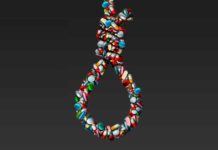“Is Depression an Illness? Or Part of the Human Condition?”
Psychotherapist Chantal Marie Gagnon voices her frustration with social media posts and stigma reduction ads that perpetuate the belief that all mental health issues...
The Evidence-Based Mind of Psychiatry on Display
The writings of Pies and his colleagues, I believe, provide a compelling case study of cognitive dissonance. Cognitive dissonance arises when people are presented with information that creates conflicted psychological states, challenging some belief they hold dear, and people typically resolve dissonant states by sifting through information in ways that protect their self-esteem and their financial interests. It is easy to see that process operating here.
A Moment Passed Too Often
What if, in that moment, nothing happened? What if I was given a second to collect myself enough to engage in the conversation surrounding my future? No one asked me what I would like to do. I was never given the chance to regain my equilibrium before I was drugged and bagged for the next decade.
Antidepressants Not a ‘One Size Fits All’ Solution, Researchers Find
The largest ever study of the thoughts and reactions of antidepressant users reveals that many people have vastly different understandings and experiences of the...
A Worldwide Epidemic – The Misuse of Anti-Depressant Medications
Not all people who have letters after their names are actually "gods" or even people who have any special powers to know things about us more than we can learn about ourselves, about our own bodies, and our own minds. Blindly following what someone says we need to be doing for our own health (mental or physical) and well-being just because they have a white jacket on (so to speak) is usually not in our best interests.
“Heal the Artists, Save the World”
Kelly Brogan, MD, writes: "Maybe your depression, chronic fatigue, ADHD, and chemical sensitivity are just ways that your body, mind, and soul, are saying no....
In Honor of Fear and Pain
Our use of antidepressants has turned single-episode struggles that recovered 85% of the time within one year, never to recur, into chronic and debilitating disorders that hold patients hostage in their own arrested development. But, If you are in the hole of pain, here’s what I have to say to you. It’s what I say to my patients, and what I tell myself in times of struggle.
“The Unfulfilled Promise of the Antidepressant Medications”
A new article in The Medical Journal of Australia laments that, while antidepressant use continues to climb, the research evidence shows that their effectiveness...
“Medicare Drug Program Fails to Monitor Prescribers, Putting Seniors and Disabled at Risk”
ProPublica and The Washington Post have performed an investigation revealing that Medicare has failed to monitor the safety of the large quantities of drugs...
Mental Health in Black and White
When I looked through my mountains of medical records, I saw that the providers who listed my race as black applied diagnoses like major depressive disorder and PTSD. The providers who saw me as white preferred diagnoses of panic disorder and borderline personality disorder. Of course, my experiences are just anecdotal. But if racial bias due to subjective experiences of practitioners can play such a large role in mental health diagnostics, how is this even considered a scientific discipline?
Do We Really Need Mental Health Professionals?
Professionals across the Western world, from a range of disciplines, earn their livings by offering services to reduce the misery and suffering of the people who seek their help. Do these paid helpers represent a fundamental force for healing, facilitating the recovery journeys of people with mental health problems, or are they a substantial part of the problem by maintaining our modestly effective and often damaging system?
Childhood Trauma Predicts Lack of Response to Antidepressants
Research in Translational Psychiatry finds that childhood maltreatment and trauma predict a greater likelihood of developing chronic depression, and a reduced likelihood of responding to treatment...
Report from the Parliament: Can Psychiatry At Least Be Curious?
In the past six years, I have had the opportunity to speak at several conferences or meetings that I felt had particular potential to stir some political activity that would challenge current psychiatric practices, and one of those events was the meeting convened in the U.K.’s Parliament on May 11th, which had this title for the day: Rising Prescriptions, Rising Mental Health Disability: Is There a Link?
Antidepressants Do Not Prevent Suicides, May Increase Risk
When the CDC released data revealing an increasing suicide rate in the US, some experts, speaking to major media outlets, speculated that the increase...
“What Are Delusions – And How Best Can We Treat Them?”
For The Conversation, psychologist John Done, from the University of Hertfordshire, explains his approach to discussing delusions with his patients. Done recommends more qualitative...
Psych Patients Who Resist Stigma Do Better
A new study in press in the Journal of Schizophrenia Research finds that patients who actively resist the negative stigma associated with mental health...
Olanzapine Can Cause Serious Skin Reaction, FDA Warns
The US FDA has issued a new warning for the atypical antipsychotic Olanzapine, also known by the brand names Zyprexa and Symbyax. The agency...
“Politicians and Experts Meet at Parliament to Explore Record Antidepressant Prescribing and Disability”
The All-Party Parliamentary Group for Prescribed Drug Dependence is meeting today, May 11th, to discuss evidence of the link between the rise in disability...
Making the Case Against Antidepressants in Parliament
On Wednesday, May 11, there will be an inquiry by a work group in the U.K.’s Parliament into whether increases in the prescribing of antidepressants are fueling a marked increase in disability due to anxiety and depression in the U.K. I wrote about a similar rise in disability in the United States in Anatomy of an Epidemic, and the All Party Group for Prescribed Drug Dependence, which is the Parliamentary group that organized the debate, asked me to present the case against antidepressants.
“The New Eugenics: Why Genetic Theories of Mental Illness and Addiction Are a Damaging...
For The Influence, addiction expert Stanton Peele criticizes our current genetic and biological “brain disease” approaches to addiction and mental health.
Article →
ADHD: The Hoax Unravels
At the risk of stating the obvious, ADHD is not an illness. Rather, it is an unreliable and disempowering label for a loose collection of arbitrarily chosen and vaguely defined behaviors. ADHD has been avidly promoted as an illness by pharma-psychiatry for the purpose of selling stimulant drugs. In which endeavor, they have been phenomenally successful, but, as in other areas of psychiatry, the hoax is unraveling.
New York Times Hosts Debate on Psychiatric Institutionalization
In the Room for Debate section of this weekend's New York Times, specialists in ethics, psychiatry, social work, addiction, and human rights hash out their...
“‘You Want a Description of Hell?’ OxyContin’s 12-Hour Problem”
A new LA Times investigation finds that Purdue Pharma’s claims that OxyContin, a chemical cousin of heroin, could relieve pain for twelve hours led some...
Mindfulness Therapy Can Prevent Depression Relapse, Review Finds
Mindfulness-based cognitive therapy (MBCT) may be more effective at reducing the risk of depressive relapse compared to current standard treatments with antidepressant drugs. A...
Restoring Study 329: Letter to BMJ
When we set out to restore GSK’s misreported Study 329 of paroxetine for adolescent depression under the RIAT initiative, we had no idea of the magnitude of the task we were undertaking. After almost a year, we were relieved to finally complete a draft and submit it to the BMJ, who had earlier indicated an interest in publishing our restoration. But that was the beginning of another year of peer review that we believed went beyond enhancing our paper and became rather an interrogation of our honesty and integrity. Frankly, we were offended that our work was subject to such checks when papers submitted by pharmaceutical companies with fraud convictions are not.











